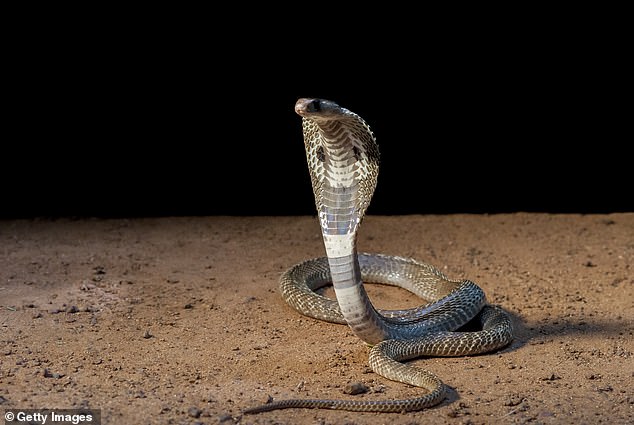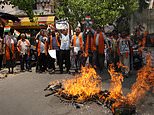Indian man shockingly bites snake to death after reptile attacked him in his sleep
If you were bitten by a snake as you slept, what would your first reaction be?
To scream? Dive out of bed? Run?
Santosh Lohar had a different reaction and bit the snake to death in retaliation.
The 35-year-old from Panduka, Kharkhand in India, had been sleeping when the reptile attacked him, prompting him to take the unusual tactic of quickly grabbing the reptile with an iron rod and biting it twice.

Santosh Lohar (pictured) said he bit the snake because a local superstition says that biting a snake twice will nullify the venom
Work was underway to lay railway lines in a forested area when the attack occurred at the laborer’s base camp.
When asked why he bit the snake back, Lohar told India Today: ‘In my village, there's a belief that if a snake bites you, you must bite it back twice to neutralize the venom.’
Although a venomous snake bite can prove lethal, a human biting the snake would have little consequences aside from putting the person at risk of receiving another attack.
This is because snake venom is stored in the reptile’s gland and is only triggered when it enters the bloodstream - otherwise, it’s just a protein-like substance.
In fact, snake venom has been used in medicine to treat many conditions including cancer, high blood pressure, heart attacks, strokes, and Alzheimer’s and Parkinson’s disease.
The type of snake that attacked Lohar has not been confirmed and he was rushed to a nearby hospital where he was given an anti-venom antidote and was released the following day.
Bihar, the region where the railway construction was underway, is one of the top three states in India that accounts for the greatest number of snakebite attacks, amounting to roughly 4,500 annual deaths, according to the National Health Mission.
India is home to nearly 300 snake species - more than 60 of which are highly venomous - including the Indian Cobra, the Russell’s viper, the common krait and the saw-scaled viper.
These are often called the ‘Big Four’ because of their powerful venom and the number of snake bites they cause each year.
According to a 2020 study, the Russell’s viper was at fault for 43 percent of all snakebites in India from 2000 to 2019 while kraits accounted for 18 percent of all bites and cobras amounted to 12 percent.
These venomous bites contain neurotoxins which cause symptoms like blurred vision, difficulty breathing, pain, and swelling.

Pictured: Indian Cobra, one of the most venomous snakes in India
The venom attacks the circulatory system, nervous system and muscular system and can destroy the outer membrane of capillary vessels which can cause internal bleeding and blood clots.
Capillaries are the smallest and most numerous blood vessels in the human body that connect arteries to veins.
‘Bites by venomous snakes can cause acute medical emergencies involving shock, paralysis, hemorrhage, acute kidney injury and severe local tissue destruction that can prove fatal or lead to permanent disability if left untreated,’ the study said.
If a person does receive a snake bite, doctors advise that they seek medical help immediately and remove any rings and watches before the body starts swelling.
It’s also important to safely take a photo of the snake so the doctors can identify it’s breed for treatment.
While waiting for medical help, the person should also sit in a neutral position to slow the spread of the venom and clean the bite with soap and water.



























































































































































































